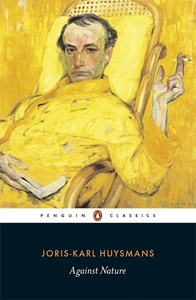You need to sign in or sign up before continuing.
Take a photo of a barcode or cover
3.5
Very decent edition of Huysmans’ classic. Not so much a novel as a critical look at art and literature. Worth a look for the highly memorable and downright despicable protagonist.
This was an ARC in exchange for an honest review. With thanks to Netgalley and Dover.
Very decent edition of Huysmans’ classic. Not so much a novel as a critical look at art and literature. Worth a look for the highly memorable and downright despicable protagonist.
This was an ARC in exchange for an honest review. With thanks to Netgalley and Dover.
a long and profound exercise in criticism ... i found it at times difficult to believe why the book created such a scandal when it first came out; but, of course, much may be said about the difference in times.
i did enjoy it thoroughly, and it was at once frustrating and amusing that the great nineteenth-century crisis was the same as the one we face today, that of capitalism and haphazard commercialisation.
i did enjoy it thoroughly, and it was at once frustrating and amusing that the great nineteenth-century crisis was the same as the one we face today, that of capitalism and haphazard commercialisation.
challenging
dark
funny
reflective
slow-paced
Plot or Character Driven:
Character
Strong character development:
No
Loveable characters:
Complicated
Diverse cast of characters:
No
Flaws of characters a main focus:
Yes
Un libro rivoluzionario e assolutamente originale, in cui un giovane parigino, ricco, aristocratico e deluso dalla vita mondana a cui è ormai forzatamente abituato, sceglie di ritirarsi in una sorta di eremo "artificiale". Limitando al minimo il contatto con le altre persone, inizia a coltivare la sua personalissima realtà, assecondando ogni suo desiderio estetico ed edonistico.
Ho amato tantissimo questo libro piuttosto complesso e non sempre apprezzato.
Volutamente artificioso, malinconico e "cervellotico", come il raffinato e insoddisfatto protagonista. Quando lo lessi la prima volta condividevo il punto di vista di Des Esseintes, il protagonista della storia, il suo tentativo di ricreare una propria dimensione che esuli dal normale consesso umano e dalle esperienze che esso comporta.
Ora, invece, ho compreso e sono piuttosto convinto che non si può fare a meno della Vita.
Ho amato tantissimo questo libro piuttosto complesso e non sempre apprezzato.
Volutamente artificioso, malinconico e "cervellotico", come il raffinato e insoddisfatto protagonista. Quando lo lessi la prima volta condividevo il punto di vista di Des Esseintes, il protagonista della storia, il suo tentativo di ricreare una propria dimensione che esuli dal normale consesso umano e dalle esperienze che esso comporta.
Ora, invece, ho compreso e sono piuttosto convinto che non si può fare a meno della Vita.
An exploration of decadence.
I think this book might qualify as a modern novel, not in the writing style (which is very much of its time) but in the utter lack of a plot. There is only one character (Des Esseintes) and he essentially spends the entirety of the book detailing his likes and dislikes in regards to the more creative and decadent human fields. There are chapters where he discusses his favourite paintings, their meaning and impact on him, as well as chapters covering scents and fragrances, jewels and furniture, music and food, wine and sex, literature and travel. The book is understandably classed as being part of the decadence movement. And it feels like it, as though you're enjoying a sumptuous meal of the senses, an opulent and nourishing exploration of luxury and excess. He is very much a privileged member of society (more so than Huysmans) and this allows him to explore his tastes as he pleases.
Des Esseints is especially enamoured with he works of Baudelaire and Poe, delights in their writing. A lot of his praise can seem remote and out of context if you're not familiar with their work, but for the most part, you simply enjoy Des Esseintes' love for these writers. He also mentions the things he dislikes (women writers get a special mention) and laments, as many modern writers do, the era he is living though, his opinion being (as it is with contemporary writers) that we have lost something, moved into a new and less interesting period, certainly one which lacks greatness and wonder. The book ends with Des Esseintes concluding that the spiritual world of the past is gone, no longer lit by ancient hope.
The book also includes a rather famous part where Des Esseintes plans a trip to London and while eating a meal in an English restaurant in Paris as he waits for the train, he observes the English patrons, pictures the trip ahead, the streets of London, the museums, the sights and sounds, before concluding that there is no longer any need to go -- he has already experienced it in his imagination as vividly as he would in the flesh. At which point he returns home.
This is not a perfect novel by any stretch but it's very good, certainly unique, and the only book I can think of which includes a jewel encrusted turtle.
I think this book might qualify as a modern novel, not in the writing style (which is very much of its time) but in the utter lack of a plot. There is only one character (Des Esseintes) and he essentially spends the entirety of the book detailing his likes and dislikes in regards to the more creative and decadent human fields. There are chapters where he discusses his favourite paintings, their meaning and impact on him, as well as chapters covering scents and fragrances, jewels and furniture, music and food, wine and sex, literature and travel. The book is understandably classed as being part of the decadence movement. And it feels like it, as though you're enjoying a sumptuous meal of the senses, an opulent and nourishing exploration of luxury and excess. He is very much a privileged member of society (more so than Huysmans) and this allows him to explore his tastes as he pleases.
Des Esseints is especially enamoured with he works of Baudelaire and Poe, delights in their writing. A lot of his praise can seem remote and out of context if you're not familiar with their work, but for the most part, you simply enjoy Des Esseintes' love for these writers. He also mentions the things he dislikes (women writers get a special mention) and laments, as many modern writers do, the era he is living though, his opinion being (as it is with contemporary writers) that we have lost something, moved into a new and less interesting period, certainly one which lacks greatness and wonder. The book ends with Des Esseintes concluding that the spiritual world of the past is gone, no longer lit by ancient hope.
The book also includes a rather famous part where Des Esseintes plans a trip to London and while eating a meal in an English restaurant in Paris as he waits for the train, he observes the English patrons, pictures the trip ahead, the streets of London, the museums, the sights and sounds, before concluding that there is no longer any need to go -- he has already experienced it in his imagination as vividly as he would in the flesh. At which point he returns home.
This is not a perfect novel by any stretch but it's very good, certainly unique, and the only book I can think of which includes a jewel encrusted turtle.
I was lead to À rebours (the English translation I read was titled Against the Grain as opposed to the more traditional Against Nature) through my recent reading of Wilde’s The Picture of Dorian Gray. À rebours is purportedly the “Yellow Book” that enthralled Dorian.
The focus of the story is Jean Des Esseintes, a nervous and sickly man in his 30s. He held humanity in contempt, referring to people as scoundrels and imbeciles, so he sought refuge and isolation on top of Fontenay-aux-Roses. During his isolation, he rambles on with is opinions about art, literature, food, music and just about anything related to the senses.
The text is incredibly sensual and layered with descriptions typical of decadent writings. As an example, he described his bedroom’s décor with the phrase “women loved to immerse their nudity in this bath of warm carnation [light], made fragrant with the odor of mint emanating from the exotic wood of the furniture.” The book contains luxurious details to the point where you can feel brocade, smell incense and see light reflected from polished and jeweled surfaces. Another example in describing his library: “Between two gilded copper monstrances of Byzantine style, originally brought from old Abbaye-au-Bois de Bièvre, stood a marvelous church canon.”
The book presented frequent anti-naturalist themes and attitudes. (Hence the Against Nature title.) In one chapter, the author described Des Esseintes’ ornate decoration of a tortoise’s shell with gold guilt and jewels and minerals. The motif and materials used for the design are painstakingly described. The fact that this decoration resulted in the death of the animal was only conveyed in one short sentence at the end of the chapter. In another part of the book, Des Esseintes describes how nature’s rendition of flowers is lacking so he recreates them using wire, paper and fabric to a more glorious effect. He then duplicates their fragrances through the art of perfumery. Again, the descriptions are provided in minutiae and the final product is believed to be far better than what can be found in nature. His attitude is best summed up in the line “There can be no doubt about it: this eternal, driveling, old woman is no longer admired by true artists, and the moment has come to replace her by artifice.”
The most difficult chapters were those dedicated to literature. One provides an in-depth comparison of classical Latin writings to which I’ve had little to no exposure. Another provided reviews and critiques of French authors of the day (mid-1880). This chapter did lead me to read some works of Baudelaire with whom Des Esseintes had a strong obsession believing that “the prose poem represented the concrete juice of literature, the essential oil of art.”
There really is no plot to À rebours. Instead, it’s merely a collection of observations presented with beautiful language. Through the story, Des Esseintes’ health continues to decline. His doctor’s advice is to “get a life” and the book ends abruptly with Jean’s return to Paris.
The focus of the story is Jean Des Esseintes, a nervous and sickly man in his 30s. He held humanity in contempt, referring to people as scoundrels and imbeciles, so he sought refuge and isolation on top of Fontenay-aux-Roses. During his isolation, he rambles on with is opinions about art, literature, food, music and just about anything related to the senses.
The text is incredibly sensual and layered with descriptions typical of decadent writings. As an example, he described his bedroom’s décor with the phrase “women loved to immerse their nudity in this bath of warm carnation [light], made fragrant with the odor of mint emanating from the exotic wood of the furniture.” The book contains luxurious details to the point where you can feel brocade, smell incense and see light reflected from polished and jeweled surfaces. Another example in describing his library: “Between two gilded copper monstrances of Byzantine style, originally brought from old Abbaye-au-Bois de Bièvre, stood a marvelous church canon.”
The book presented frequent anti-naturalist themes and attitudes. (Hence the Against Nature title.) In one chapter, the author described Des Esseintes’ ornate decoration of a tortoise’s shell with gold guilt and jewels and minerals. The motif and materials used for the design are painstakingly described. The fact that this decoration resulted in the death of the animal was only conveyed in one short sentence at the end of the chapter. In another part of the book, Des Esseintes describes how nature’s rendition of flowers is lacking so he recreates them using wire, paper and fabric to a more glorious effect. He then duplicates their fragrances through the art of perfumery. Again, the descriptions are provided in minutiae and the final product is believed to be far better than what can be found in nature. His attitude is best summed up in the line “There can be no doubt about it: this eternal, driveling, old woman is no longer admired by true artists, and the moment has come to replace her by artifice.”
The most difficult chapters were those dedicated to literature. One provides an in-depth comparison of classical Latin writings to which I’ve had little to no exposure. Another provided reviews and critiques of French authors of the day (mid-1880). This chapter did lead me to read some works of Baudelaire with whom Des Esseintes had a strong obsession believing that “the prose poem represented the concrete juice of literature, the essential oil of art.”
There really is no plot to À rebours. Instead, it’s merely a collection of observations presented with beautiful language. Through the story, Des Esseintes’ health continues to decline. His doctor’s advice is to “get a life” and the book ends abruptly with Jean’s return to Paris.
This book is about everything. This book is about nothing. Those statements are as deep as they do or do not sound.
When I endeavor to form thoughts concerning this book, a senseless stream of profanity rages in my head for several minutes before I regain the capacity to cohere. I would comment on what that means qualitatively, but just know....it's better this way.
I really must applaud Huysmans. This books is lavish, horrific, compelling, and almost unmoving all at the same time. I would elaborate, but it's much more entertaining if I continue to do nothing at all.
I consider my review the spiritual successor to this book. Please, Loathe Me Now.
(A few serious notes):
- The irony of this book is that it manages a certain drab exhaustion alongside its decadence. I suppose that's at least part of the point, but no matter how much whimsy I felt while reading it, it was a trek. It will probably try you.
-My edition had an essay from Huysmans that discussed his hatred towards the book represented in light of his conversion to Christianity later in life. It's an interesting read, and I would recommend checking it out. It's always intriguing to see Author's renounce or begrudge their own work as they grow and change. I'll leave you to consider his position, but it's interesting nonetheless.
- This books is definitely modernist and for that reason, as for every book I've read from the period, I both love and hate it. In short, any novel where the protagonist is insane enough to tempt young men into sex addiction for the purpose of undermining the moral fabric of society (because he's bored) sounds like a book I want to read!....Oh wait. Alright, I'm done.
When I endeavor to form thoughts concerning this book, a senseless stream of profanity rages in my head for several minutes before I regain the capacity to cohere. I would comment on what that means qualitatively, but just know....it's better this way.
I really must applaud Huysmans. This books is lavish, horrific, compelling, and almost unmoving all at the same time. I would elaborate, but it's much more entertaining if I continue to do nothing at all.
I consider my review the spiritual successor to this book. Please, Loathe Me Now.
(A few serious notes):
- The irony of this book is that it manages a certain drab exhaustion alongside its decadence. I suppose that's at least part of the point, but no matter how much whimsy I felt while reading it, it was a trek. It will probably try you.
-My edition had an essay from Huysmans that discussed his hatred towards the book represented in light of his conversion to Christianity later in life. It's an interesting read, and I would recommend checking it out. It's always intriguing to see Author's renounce or begrudge their own work as they grow and change. I'll leave you to consider his position, but it's interesting nonetheless.
- This books is definitely modernist and for that reason, as for every book I've read from the period, I both love and hate it. In short, any novel where the protagonist is insane enough to tempt young men into sex addiction for the purpose of undermining the moral fabric of society (because he's bored) sounds like a book I want to read!....Oh wait. Alright, I'm done.







